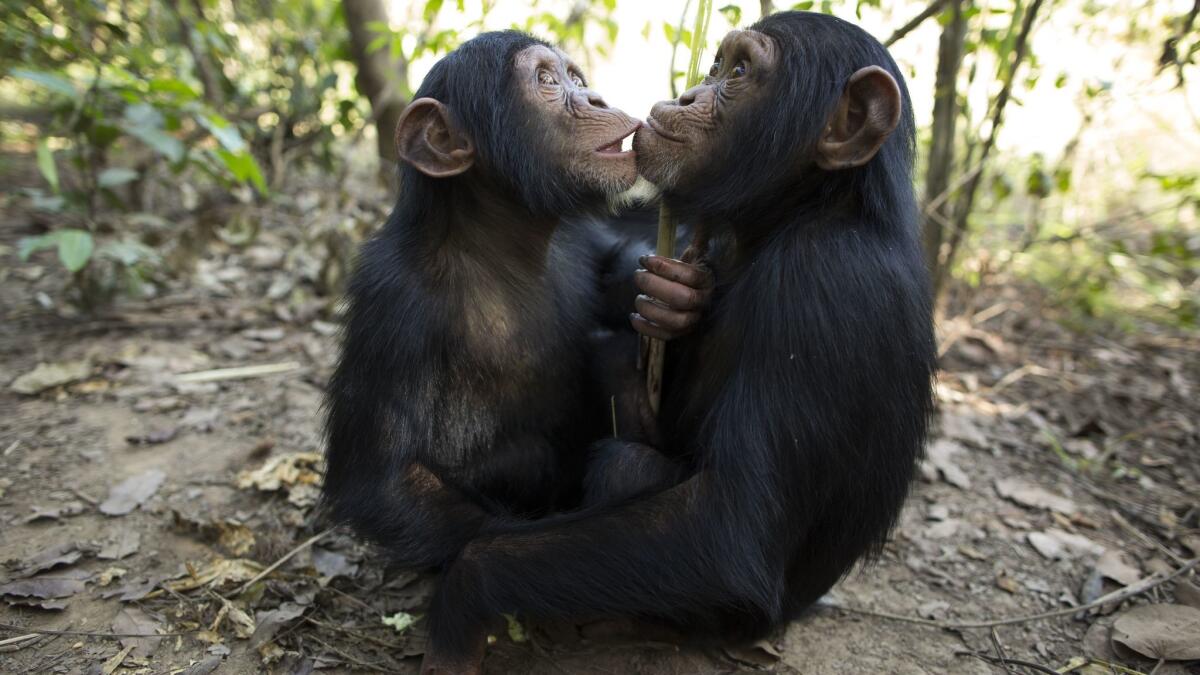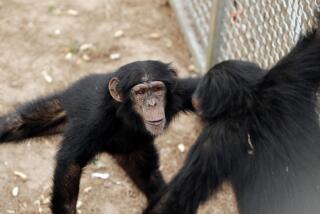Chimpanzees may be helpful, but humans are the only primates that are kind to others, study suggests

- Share via
Maybe the reason we call it “human kindness” is because that’s the only kind there is.
We humans might find nothing more heartwarming than seeing other animals befriend and take care of each other. But new research suggests that, although they appear to perform random acts of kindness, chimpanzees, our primate relatives with the most complex social lives, do not actually act with the simple intention of pleasing one another.
That conclusion will probably stir controversy, because chimps appear to engage in many kinds of social activities that would appear to require kindness. They groom one another — but is that kindness or just the opportunity for a delicious treat? They risk personal injury by keeping watch while others sleep — an act of selfless kindness or a bid to protect their genetic progeny? They console one another after fights erupt — again, kindness or self-protection against a riled-up friend or family member?
Demonstrating intention — or more important, lack of intention — in a species that lacks the means to communicate such a complex notion is not easy. But three evolutionary and comparative psychologists at universities in Britain and Germany set out anyway to test whether chimpanzees knowingly exhibit kindness.
Researchers established an experimental game for 16 chimpanzees living in a Ugandan sanctuary for animals rescued from the illegal wildlife trade.
In this game for two, one chimpanzee could perform a maneuver that would result in the delivery of a few peanuts to another chimpanzee, but not to itself. The chimp with the key to the peanut dispenser would quickly learn that its action would dispense peanuts to the other chimp, because it could see the other enjoying peanuts every time it performed the required maneuver. But the chimp would, over time, discern that this action would never result in its getting any peanuts.
At first, the chimp with access to the peanut dispenser would knock itself out to pull the required lever. But as it became clear that doing so would offer no personal benefit, the peanut-dispensing chimp just stopped pulling the lever.
That pattern was a distinct contrast to what would be seen if the chimp perceived any reward to performing the maneuver. If it were getting peanuts, the behavior would continue until the chimp was no longer hungry. If it felt a warm rush of kindness seeing that its action had resulted in the other chimp getting a treat, it would have continued to perform the maneuver. But that was not the pattern the researchers observed.
Neither, for the record, did the chimps act in ways that would suggest spite. When given the opportunity to perform a separate maneuver that would deny another chimp access to a reward of peanuts, the chimps tried the maneuver a few times and finally stopped.
“Chimpanzees did not act to produce benefits for others in a helping context,” the authors of the new research wrote. Even the prospect of gaining status, or a reputation for generosity, did not seem to sway them to pull that peanut lever for a fellow chimp, the authors of the research wrote: The chimp with access to the dispenser could see that the other chimp could see it, and that the other chimp knew that its actions were making the peanuts come down the chute.
But that was not, evidently, reason enough to bother to pull the lever.
Any benefits or harms that came to a fellow chimp as a result of pulling the lever “did so as incidental byproducts of a personal interest in the stimulus,” and not to kindness, wrote the authors in the journal Nature Communications. Where other experiments appear to have found evidence for kindness in nonhuman primates, they suggest, experimenters should look for evidence that they inadvertently engaged an experimental animal’s sense of play or self-interest.
Follow me on Twitter @LATMelissaHealy and “like” Los Angeles Times Science & Health on Facebook.
MORE IN SCIENCE
The world’s largest diamonds reveal secrets of the inner Earth
If your gift choices seem to disappoint, psychology may explain why







